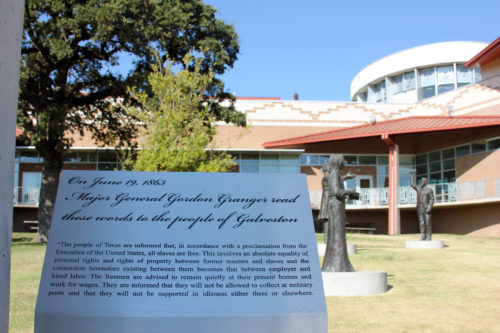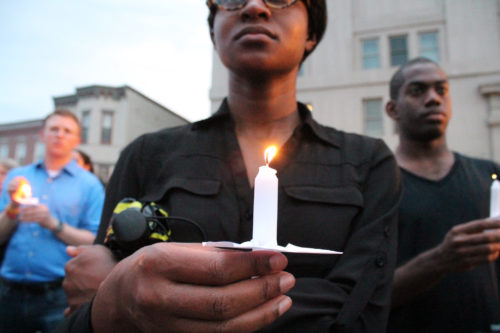
“Juneteenth isn’t just a celebration of emancipation, it’s a celebration of our commitment to make it real.”– Jamelle Bouie
This time of year is associated with the heat, vacations, and the Summer Solstice. Kids are out of school; people are preparing for the 4th of July and many are giving a collective sigh of relief as summer marks a milestone in the evolution of the calendar year.
But for a portion of Americans, there is a milestone in June that has nothing to do with any of these things and instead is solely about freedom.
Juneteenth is just that – an historic day of freedom for Black Americans. Filled with celebrations, festivals, and remembrance, the date June 19 marks the end of chattel slavery in all of the states within the U.S. According to the Juneteenth historical website:
“Juneteenth is the oldest known celebration commemorating the ending of slavery in the United States. Dating back to 1865, it was on June 19th that the Union soldiers, led by Major General Gordon Granger, landed at Galveston, Texas with news that the war had ended and that the enslaved were now free. Note that this was two and a half years after President Lincoln’s Emancipation Proclamation – which had become official January 1, 1863.”

[Wikimedia]
We do know that there was a mass migration of slave owners from Southern States to Texas in order to avoid the news of freedom. In a Slate article,titled The Black American Holiday Everyone Should Celebrate but Doesn’t, the author mentions how many slave owners moved to avoid losing their slaves. The article reads:
“News of emancipation would move slowly, which would be compounded by the mass migration of slave owners, who fled their holdings in Louisiana and Mississippi—slaves in tow—following the Union victories at New Orleans in 1862 and Vicksburg in the spring and summer of 1863. Tens of thousands of slaves arrived in Texas, joining the hundreds of thousands in the interior of the state, where they were isolated from most fighting and any news of the war.”
It is said that General Granger, upon arrival in Texas, recited General Order #3 to inform the people of the new legal status of formerly enslaved people. That statement reads:
“The people of Texas are informed that, in accordance with a proclamation from the Executive of the United States, all slaves are free. This involves an absolute equality of personal rights and rights of property between former masters and slaves, and the connection heretofore existing between them becomes that between employer and hired labor. The freedmen are advised to remain quietly at their present homes and work for wages. They are informed that they will not be allowed to collect at military posts and that they will not be supported in idleness either there or elsewhere.”
Today 45 of the 50 states in the United States now recognize Juneteenth as either a state holiday or a day of Celebration, and Galveston, Texas has become a destination to celebrate the execution of freedom for all slaves. As one of the longest celebrated days of remembrance in our country, it is surprising that there is not a lot of discussion within the magical community about the importance of honoring the ancestors of slavery during this celebratory time.
For many of people of color, and specifically Black people, Juneteenth has become a symbol of empowerment and a reflection of resilience from our past. I have found some of the most profound moments of ancestral connection and reverence by celebrating and engaging with the spirit of Juneteenth. There is a lot of magical significance in the resulting resiliency from slavery and the slow process of freedom.
The lack of discussion about such holidays points to a larger systemic issue of how our history and celebrations are filtered by the norms of the over-culture. There are often distinctions made within marginalized cultures of what is just for that group to celebrate and what is a celebration of larger society.
What makes this particular holiday different than other culturally-based celebrations is the historical importance of this moment for all Americans. This specific day in time acknowledges a very important step in the shift of what was to become the next level of fight for freedom in this country.
When reading this one might ask why this may be important today. While there are a lot of ways to answer that question, one of the most relevant things we could talk about is how important it is for us to connect to the fight for freedom and justice. That discussion is still very relevant in many segments of society and has been an ongoing need for the Black community specifically.
We are aware that neither the Emancipation Proclamation, nor the activities of June 19, 1865, ended the legacy of slavery in this country. Legalized forms of slavery continue to this day in the U.S. even if federally-approved chattel slavery came to an official end.
Celebrations hosted in cities around the country are open to the public for observance and participation of this monumental moment in American history. There are some people that make their way to a local Juneteenth celebration in order to enjoy moments of prayer, good food, and music. Others might find themselves desiring a introspective moment with their families and their ancestors.
Author and Priestess Lilith Dorsey has written several pieces on her Voodoo Universe blog discussing the many celebrations of Juneteenth. In her piece Juneteenth Recipe Roundup, she speaks to the importance of food in celebration. Dorsey writes, “For at it center Juneteenth is about celebrating our hard won freedom on every level…. nourishing ourselves no matter what illusions life dishes out.”
Despite the horrific conditions of slavery and the lack of access to things very necessary for survival, food became a shared symbol of celebration and hope; this makes food a natural way to share, reflect, and spend time with our loved ones. In the following article, Dorsey shares Juneteenth celebratory recipes for fried chicken, strawberry lemonade, and collard greens.
In addition to the celebratory qualities of food, different ancestral folk magic and beliefs were tied to the properties and symbolism of things that were ingested into the body. Many of these folk remedies or “southern wives-tales” continue to be passed down from generation to generation, carrying our history in the customs we have inherited – black eye peas for prosperity; honey for sweetness; lemons for cleansing.

[Photo Credit: Elvert Barnes]
- Reflection and mindfulness about the price of freedom.
- Light a candle to honor those who suffered and for those who are still fighting
- Spend the day educating others about the reality of systemic injustice and our history
- Do magic for protection for those who are the most vulnerable today from systemic and structural racism.
- Ancestral reverence as your practice allows
- Cook a meal, share a meal, and spend time with others in the name of freedom
- Recite poems, writings, and reflections from those of African descent in your workings and rituals.
This year for Juneteenth I will light up my altar, recite a piece I wrote a few years ago, and cook a good meal for my family. I plan to talk about and deeply reflect on the price of freedom back then, and today. It has become an integral part of my practice and my connection to the ancestors to honor the journey to freedom and to give voice to their pain. I got the chance to briefly ask Dorsey what she will be doing this year for Juneteenth. She told me she would be “feasting and celebrating what it really means to be free.”
It is clear today that the necessity of freedom and the power of one’s own agency continues to be an important thread connecting our fight for justice, equity, and survival.May we all remember that freedom is often slow in it’s delivery, and is never free.
Juneteenth Poetry
Justice delayed from fringed time frazzled cry
Until the DREAM can heal itself and broken trust
Negroes shackled minds in the velvet shadows try
Evolving with a nation drunken in bloody lust
Trapped in tragedy of a blurred emancipation line
Edged to the margin of Reconstruction, it tells
Empty enactment lagging that Constitutional hell
Nattering historic lies, blood and tongue dispels
Truth against the moral lie, all brotherhood a shell
Heaven’s rich cause stumble in raged hearts to fill.
______________________________________
“Regardless of where they went, they were followed with freedom’s challenges;
These challenges came from making decisions and environmental changes.
They never forgot that joyous 19th day of June;
When people once enslaved could finally sing their freedom tune.
The celebration started with reassuring and praying;
The adults were eating and drinking while the children were playing.
It was also a time for the reuniting of family members;
It was one of the happiest days many of them remembers.
Today it is a day of pilgrimage to that town;
Let the shouts of freedom for all make a holy sound.
Soon the day will come when in unison we say;
“Forever and ever all Americans will celebrate Juneteenth, the freedom holiday”!
____________________________________
A poem and essay by Jupiter Hammon, an 18th century slave
____________________________________
Writer’s Note: I cannot write a piece reflecting on freedom of black people in the United States on this day without mentioning the recent verdict of not guilty with regard to the death of Philando Castile. I cannot ignore the horrific irony that on the weekend of Juneteenth we are reminded that freedom is still subjective to circumstances and we still don’t have it.
* * *
The views and opinions expressed by our diverse panel of columnists and guest writers represent the many diverging perspectives held within the global Pagan, Heathen and polytheist communities, but do not necessarily reflect the views of The Wild Hunt Inc. or its management.
The Wild Hunt is not responsible for links to external content.
To join a conversation on this post:
Visit our The Wild Hunt subreddit! Point your favorite browser to https://www.reddit.com/r/The_Wild_Hunt_News/, then click “JOIN”. Make sure to click the bell, too, to be notified of new articles posted to our subreddit.